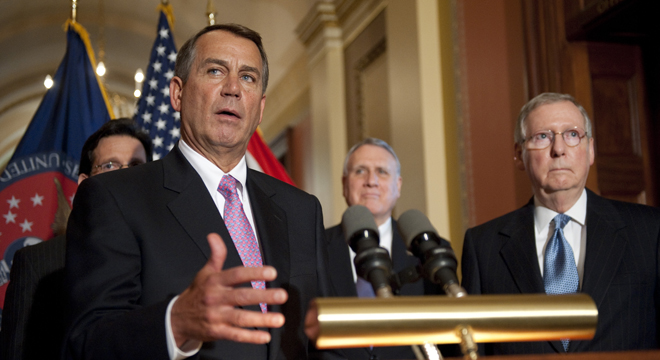Senate Republicans quickly united behind House Speaker John Boehner (R-OH) on Tuesday after he telegraphed his intention to use the debt limit as leverage to avoid a scheduled tax increase. Democrats balked at his demand that raising the debt ceiling — which is set to max out this December — be paired dollar-for-dollar with spending “cuts and reforms.” The widening rift foreshadows another self-inflicted battle, the likes of which nearly collapsed the U.S. economy last fall.
“A request of the President to ask us to raise the debt ceiling ought to generate a significant response to deal with the problem of deficit and debt,” Senate Minority Leader Mitch McConnell (R-KY) told a handful of reporters Tuesday afternoon in the Capitol.
In a Tuesday speech, Boehner said, “I will again insist on my simple principle of cuts and reforms greater than the debt limit increase” — something his conference did last summer. Further hinting at chaos, he scoffed at the idea of raising taxes, even as Democrats insist they won’t agree to another major debt-reduction deal that excludes new revenues.
McConnell wasn’t the only Republican senator who backed up Boehner’s stance.
“I think we need to take responsible action here and now on all of these issues,” retiring Sen. Olympia Snowe (R-ME) told TPM. “Because until we deal with the essential questions at hand — on the debt, on the debt ceiling, on taxes and regulation — we’re going to continue to have a very precarious economic environment. … Americans are fearful right now. That’s the one word I hear consistently. They’re fearful about the future and they’ve never been fearful before as they are now. Why? Because we’re not addressing the issues. And the more we postpone, obfuscate, it severely impacts the well-being of our country, and that’s a travesty. So we need to take concerted action.”
She said the debt ceiling is “absolutely” a good opportunity to address these issues. But tellingly, even Snowe, arguably the most moderate Senate Republican, didn’t budge from the party line in resistance to new revenues. “Well, you know, I would look at tax reform first because I don’t think this is a great time to be raising taxes,” she said.
Snowe defended Boehner against the Democrats’ charge that he’s putting the economy at risk, saying, “I don’t know that that’s what he was intending.” She said the demand was “his decision, but I think the problem is we’re not addressing anything. So I don’t know what his rationale is, but we’re not dealing with anything, which is my major concern.”
Sen. Kelly Ayotte (R-NH), a rising GOP star, unequivocal endorsed the speaker’s view.
“I firmly believe that we need to make sure we do have spending cuts with any increase in the debt limit,” Ayotte told TPM. “I think it’s really important that — I felt very strongly last time that we shouldn’t increase the debt limit without addressing the underlying issues that have brought us to this position of $15 trillion in debt, soon to be $16 trillion.”
Senate Democratic leaders immediately rejected Boehner’s demand as irresponsible, especially, they said, in light of the House GOP reneging on the debt limit agreement from last August.
It’s unclear whether the moment of action will come in December during the 2012 lame-duck session, or early 2013, as Treasury Secretary Tim Geithner signaled may be the case Tuesday. If Treasury finds a way to keep from maxing out the nation’s borrowing authority into 2013, it could alter the political dynamics depending on the results of the November elections.
One way or another, Congress will have to raise the debt limit again, and Republicans are likely to demand spending cuts when that happens. And the Democrats’ response to the prospect of another deficit-reduction package devoid of new tax revenues? Dream on.
“Republicans can grandstand all they want,” Senate Majority Leader Harry Reid (D-NV) told reporters Tuesday. “The fact is any agreement to avoid the fiscal cliff facing us at the end of this year must not gut programs that support the middle class, like Medicare and Social Security and education. It must be balanced with policies that ask millionaires to pay their fair share.”






